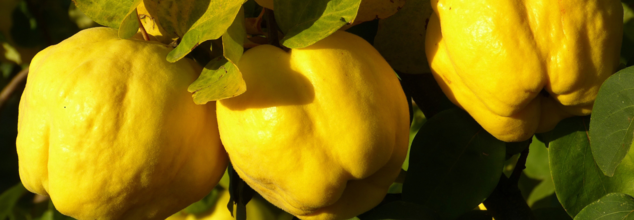
(Credit-Canva)
This Underrated Fruit Could Help Your Gut and Keep Your Heart-Healthy
Constipation and irregular bowel movements aren't just a minor inconvenience; they can really disrupt your daily life, making it hard to concentrate at work or enjoy time with friends. Feeling constantly bloated or uncomfortable can ruin your day. A 2024 study in the Journal of Gastroenterology and Hepatology showed that about 39% of adults said constipation negatively affected their personal or work lives. That's a lot of people dealing with this common problem. If this sounds familiar, you might be interested in learning about a less common fruit that could help your digestion and even benefit your heart: the quince.
What is a Quince?
A quince looks a bit like a lumpy pear or apple. You won't usually find it in regular supermarkets like you would apples or bananas, but it's worth looking for. Quinces are usually in season in the fall, making them a nice autumn treat, but you might find them other times of the year at specialty stores or online. If you're up for trying something new, keep an eye out for this unusual fruit. It's often forgotten about, but it's full of good things.
Raw quince is very different from cooked quince. It's hard as a rock and tastes very strong: bitter, sour, and astringent, which makes your mouth feel dry and puckered. Because of this, you have to cook it before eating it. Poaching it in water, sometimes with sugar or spices like cinnamon and cloves, turns it into something soft, fragrant, and delicious, with a fruity taste and a hint of vanilla. Cooking it not only makes it taste good but also makes it easier for your body to digest and get all the nutrients, like fiber and things that are good for your heart.
What Are Its Benefits
This unusual fruit isn't just tasty when cooked; it's also packed with nutrients that can be good for your body. Here are some of the ways quince can contribute to your overall health and well-being.
Fiber Content and its Benefits
Quince provides 1.75 grams of insoluble fiber per fruit (USDA). This type of fiber doesn't dissolve in water, adding bulk to stool and aiding smoother digestion. This is essential for preventing constipation and promoting regular bowel movements by softening stool and easing elimination.
Scientific Evidence for Digestive Support
Studies suggest quince benefits gastrointestinal health. A 2012 study showed reduced colon inflammation in rats given quince. A 2016 study indicated quince may alleviate constipation by aiding muscle contractions and reducing gut bacteria. A 2022 study suggests a possible link between stomach acid and constipation.
Potassium Content and Blood Pressure
Each quince contains 197 milligrams of potassium, a key mineral for healthy blood pressure. Potassium helps regulate fluids and counteracts sodium's effects. The American Heart Association notes potassium helps stabilize blood pressure, reducing heart disease risk. While not meeting daily needs alone, it’s a helpful addition.
Antioxidant Properties and Heart Health
Quince is rich in antioxidants that protect cells from damage. These compounds have shown cardioprotective effects in animal studies. A 2013 study found quince leaf extract lowered cholesterol in rabbits. Further research highlights quince antioxidants' potential benefits for the vascular system and heart health.
© 2024 Bennett, Coleman & Company Limited

